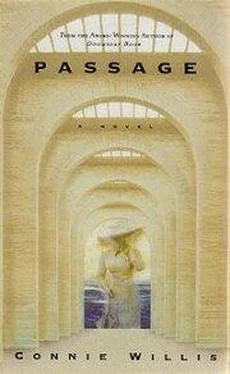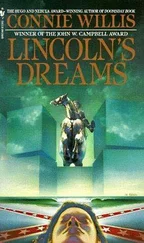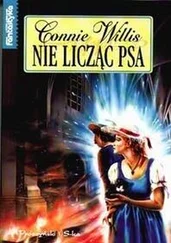Mrs. Woollam was praying, her lips moving silently. Edith Evans had her chin up proudly, bravely. “It looks for associations from long-term memory, for metaphors to explain what’s happening,” Joanna said, “and since the body’s damaged and its systems are slowly going under, it confabulates the Titanic.”
“The very image and mirror of Death,” Mr. Briarley said.
“But it isn’t real,” Joanna said. “It only seems real.”
“The sinking,” Ms. Grant said fearfully. “Will that seem real?”
“The soul cannot sink,” Stead said sternly. “It is immortal, and if this,” he waved his arm to include the cards, the fireplace, the entire room, “is, as Miss Lander says, a symbol, what else can it symbolize but the ship of the soul, eternal, indestructible?” He smiled at Ms. Grant. “Such a ship shall never sink.”
Joanna thought of Mr. Wojakowski saying earnestly, “All ships sink sooner or later.”
“Will we confabulate the sinking?” Ms. Grant repeated, and it was Joanna she was looking at.
Yes, Joanna thought, afraid. “I don’t know,” she said. “This is all just a metaphor for what the mind’s experiencing, and as the experience changes, as the brain shuts down and the synapses start firing more and more erratically, and—” She thought of what had happened to her on the way down here, memories flaring up like a match and then going out.
“And what?” Ms. Grant said frightenedly. “What will happen?”
“Nothing,” Joanna said. “As the cells die, there’ll no longer be enough to hold the unifying image together, and the Titanic will fade, or come apart. It’s already happening. This table is a table from Mercy General, and you—” She broke off and began again, “—and just now, on the stairs, I wasn’t on the Titanic. I was in the hallway of my apartment the night my father died. And before, on the Boat Deck, I saw two cheerleaders from my high school. That will happen more and more, till the image of the Titanic breaks up completely.”
“And if it doesn’t?” Ms. Grant said.
“What happened on the Titanic?” Edith asked. “After the boats were gone?”
Joanna looked at Mr. Briarley, but he was busy sorting the cards in his hand. “Her bow went under and she began to list to port,” she said. “The water came up over the forward well deck and the A Deck companionway. The lights…” she faltered.
“The lights went out,” Edith Evans said.
“Do you think that will be part of the metaphor?” Ms. Grant said fearfully. “The lights going out?”
How can it not be? Joanna thought. This is the lights going out, one by one, memory by memory, sensation by sensation, telephone calls and birthday presents and Dish Night, peanut M&M’s and snow and sitting perched on Maisie’s bed, looking at pictures of the Johnstown flood.
“What happens then?” Edith asked. “After the lights go out?”
The stern rises into the sky, Joanna thought, rearing up like a drowning swimmer, like a dying soul, and we go down into darkness.
“Death is only an illusion,” Stead said. He poked at the fire. “A snare of science and unbelief.” He flung the poker into the fire, sending up sprays of ash and sparks. “There are more things in heaven and earth, Ms. Lander, than are dreamt of in your philosophy,” he said, and stalked out of the room.
“What happens then?” Ms. Grant asked fearfully.
They take you to the morgue, Joanna thought, and cut your chest open in a Y to measure the knife wound, to determine the cause of death. And then they take you to the mortuary and inject embalming fluid into your veins and mastic compounds into your cheeks and brush your teeth with Ajax. And bury you in the ground.
“What happens then?” Edith said. “After the lights go out?”
They were all looking at her, waiting for her answer. “She sinks,” Joanna said.
There was a silence, and then Mrs. Woollam said, “ ‘When you pass through the waters, I will be with you, for I am the Lord your God.’ ” She took a quavering breath. “The important thing is to trust in Jesus.”
“And behave well,” Edith said, her chin up.
“And play the hand you’re dealt,” Yates said.
“Yes, so we should,” Joanna said, and picked up the rest of her cards. A two. A six. An ace.
“How many cards do you want?” Yates asked her.
“Two,” she said, and pushed two of her cards at Yates. He dealt her two more, and she knew what they were before she even picked them up.
“I’ll open for a hundred,” Mr. Funderburk said.
“I’ll see your hundred and raise you a hundred,” Edith said. The others, even Mr. Stead, even Mrs. Woollam, made their bets.
“I’ll see you,” Joanna said to them all, “and raise you everything I’ve got.” She pushed her stack of red chips to the center.
“When the end comes,” Edith said, reaching over to take Yates’s hand. “When it comes, what should we do?”
You’ve already done it, Joanna thought, looking enviously at them, all those mothers, all those children, you gave up your place and your life and saved them.
“The end can’t come yet,” Mr. Funderburk said. “There is supposed to be a Life Review first.”
And this is it, Joanna thought, looking at Edith, at Yates, this is the Life Review, knowing you failed where others succeeded. Being tried in the balance and found wanting. Maisie, she thought despairingly. Maisie is the important thing. And I didn’t do it.
“I call,” Yates said, and Joanna laid down her hand.
“Two pair,” she said. “Aces and eights.” The dead man’s hand.
The doors banged open and Greg stormed in. “Half of C Deck’s underwater,” he announced, “and the whole First-Class Dining Saloon.”
Ms. Grant stood up, wringing her hands. “How long before the end, do you think?”
“I don’t know,” Joanna said. “Irreversible brain death occurs in four to six minutes, but synapses continue to fire for several minutes after that—”
“It’s been longer than that,” Ms. Grant said hopefully. “Maybe—”
Joanna shook her head. “Time doesn’t—”
“The last regular lifeboat was launched at 1:55 a.m.,” Mr. Briarley said. “The lights went out at 2:15, and five minutes later the ship went down. That means there was approximately twenty minutes betwee—”
“Regular lifeboats?” Greg Menotti said. “What do you mean, regular lifeboats?”
“Time doesn’t what?” Ms. Grant asked.
“There were also four collapsible boats with canvas sides,” Mr. Briarley said, “but only two of them were launched. Collapsible A was washed off the deck and swamped, and Collapsible B capsized. The men who managed to climb aboard her bottom had to—”
“Where are they?” Greg said to Joanna.
“Greg—” Joanna said.
“Time doesn’t what?”
Greg grabbed her arm and yanked her to her feet, knocking cards and poker chips onto the floor. “Where did they keep the collapsibles?”
“On the roof of the officers’ quarters,” Mr. Briarley said.
“Where are the officers’ quarters?” Greg demanded.
“You don’t understand,” Joanna said. “This isn’t the Titanic. It’s a metaphor. We—”
Greg’s grip tightened viciously on her arm. “Where are the officers’ quarters? Which deck?”
“Even if they are there,” Joanna said, “it’s too late. You had a heart attack. You d—”
“Which deck?”
“The Boat Deck,” Joanna said.
“Where on the Boat Deck?”
“On the starboard side,” Joanna said. “Between the wheelhouse and the wire—” The wireless shack. Where Jack Phillips had kept sending out SOSs long after the boats were gone. Where he had kept sending out signals to the very end.
Читать дальше












